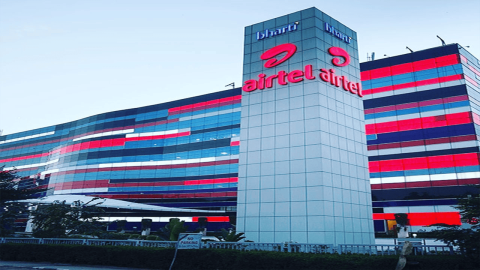Bharti Airtel Share Price in Focus after Spectrum Deal with Adani Data Networks and Launch of Cybersecurity Solutions
Bharti Airtel share price was trading 1.2 percent lower in early trades. Over last one month, Bharti Airtel stock has offered 8.5 percent return to investors. The telecom major has expanded Spectrum Footprint and Cybersecurity Leadership Amid Strategic Realignment. Sunil Mittal’s Bharti Airtel, India’s second-largest telecom operator, has intensified its competitive stance against Reliance Jio through two strategic maneuvers: a multi-regional spectrum acquisition from Adani Data Networks and a bold step in enterprise cybersecurity. As India’s digital infrastructure matures, these moves underscore Airtel’s dual ambition—to deepen network capability and become a formidable IT solutions provider.
Bharti Airtel Acquires 400 MHz Spectrum from Adani Group
In a pivotal shift in India's spectrum landscape, Bharti Airtel and its subsidiary Bharti Hexacom have finalized agreements to acquire the rights to use 400 MHz of 26 GHz spectrum from Adani Data Networks (ADNL), a unit of billionaire Gautam Adani’s Adani Enterprises.
The spectrum spans key regions—Gujarat, Mumbai, Andhra Pradesh, Rajasthan, Karnataka, and Tamil Nadu—with allocation splits of 100 MHz in Gujarat and Mumbai and 50 MHz each in the remaining four states. Originally purchased by ADNL for Rs 212 crore during the 2022 auction, the asset now shifts to Airtel's control, giving it a strategic advantage in millimeter wave deployments, particularly for 5G services and fixed wireless access (FWA).
This move positions Airtel to scale up enterprise-grade 5G offerings and compete head-on in metros and high-demand zones, where spectrum agility will be crucial.
Market Standing: Airtel’s Rising Shareholder Value
As of April 24, Airtel commanded a market capitalization of Rs 11.16 lakh crore, reinforcing its leadership in India’s digital connectivity ecosystem. The company’s stock is trading at Rs 1,862.20 (at the time of publication of this report), reflecting robust investor confidence amid an increasingly competitive telecom market.
Founder Sunil Mittal—worth USD 13.8 billion according to Forbes—has not only steered the telecom major through the Jio-induced tariff wars but is now sharpening focus on monetizing its B2B capabilities through integrated digital services.
Subscriber Growth: Airtel Leads the Industry in January 2025
According to the latest data released by the Telecom Regulatory Authority of India (TRAI), Airtel topped subscriber additions across both wireline and mobile segments in January 2025.
Net additions totaled 16.53 lakh mobile users and 1.17 lakh wireline users, outpacing rivals and showcasing Airtel's improved last-mile connectivity and customer engagement strategies.
This momentum in customer growth underscores the effectiveness of Airtel’s 5G rollout and bundling strategies, particularly in urban and semi-urban clusters.
Cybersecurity as a Strategic Vertical: iSOC Deployment for NRL
Bharti Airtel is no longer just a telecom operator. Through its enterprise division, Airtel Business, the company is emerging as a cybersecurity leader. This was made clear by its recent deployment of an AI-powered Intelligent Security Operations Center (iSOC) for Numaligarh Refinery Limited (NRL)—a public sector oil & gas firm based in Assam.
NRL faced talent constraints and geographic limitations in establishing robust cybersecurity protocols. Airtel Business addressed this with a centralized, AI/ML-enhanced solution that offers 24x7 real-time monitoring, threat detection, and compliance support across NRL’s distributed digital infrastructure.
Why it matters: India's critical infrastructure has come under mounting cyber risk. The Data Security Council of India reports a 48% rise in attacks on government institutions, and over Rs 1.25 lakh crore in losses in the oil & gas sector alone. Airtel's pivot toward managed cybersecurity services could open new revenue streams in the PSU and large enterprise segments.
Strategic Implications for Investors
Airtel’s two-pronged strategy—spectrum expansion and enterprise services diversification—bodes well for long-term investors. Here's why:
- Asset-light expansion: The acquisition of Adani’s spectrum is spectrum-rights-based, avoiding expensive infrastructure duplication.
- Enterprise moat: With initiatives like iSOC, Airtel is venturing into sectors dominated by global IT majors, giving it a cross-sector digital relevance beyond telco.
- Valuation support: At Rs 1,848/share, analysts see further upside given its rising ARPU, falling capex intensity post-5G rollout, and business diversification.
Outlook: Positioning for the Next Telecom Cycle
With Reliance Jio aggressively rolling out FWA and 5G, Bharti Airtel’s spectrum reinforcement and iSOC ventures signal preparedness for the next phase of telecom evolution—where connectivity merges with digital security, cloud, and IoT solutions.
The acquisition from Adani may also indicate a reshuffling in India’s spectrum dynamics, as Adani appears to realign toward B2B infrastructure plays rather than direct telecom.
Conclusion: Airtel’s Empire Goes Beyond Connectivity
Sunil Mittal’s Airtel is transitioning from a telecom stalwart to a diversified digital solutions provider. The spectrum deal with Adani Data Networks enhances its 5G capabilities across six critical markets, while the deployment of the iSOC platform for NRL highlights its growing role in India’s digital security fabric.
Investors should watch Airtel’s next moves closely. With a strong balance sheet, expanding market share, and entry into cybersecurity and enterprise tech, Airtel is positioning itself not just as a service provider—but as a critical enabler of India’s digital future.
